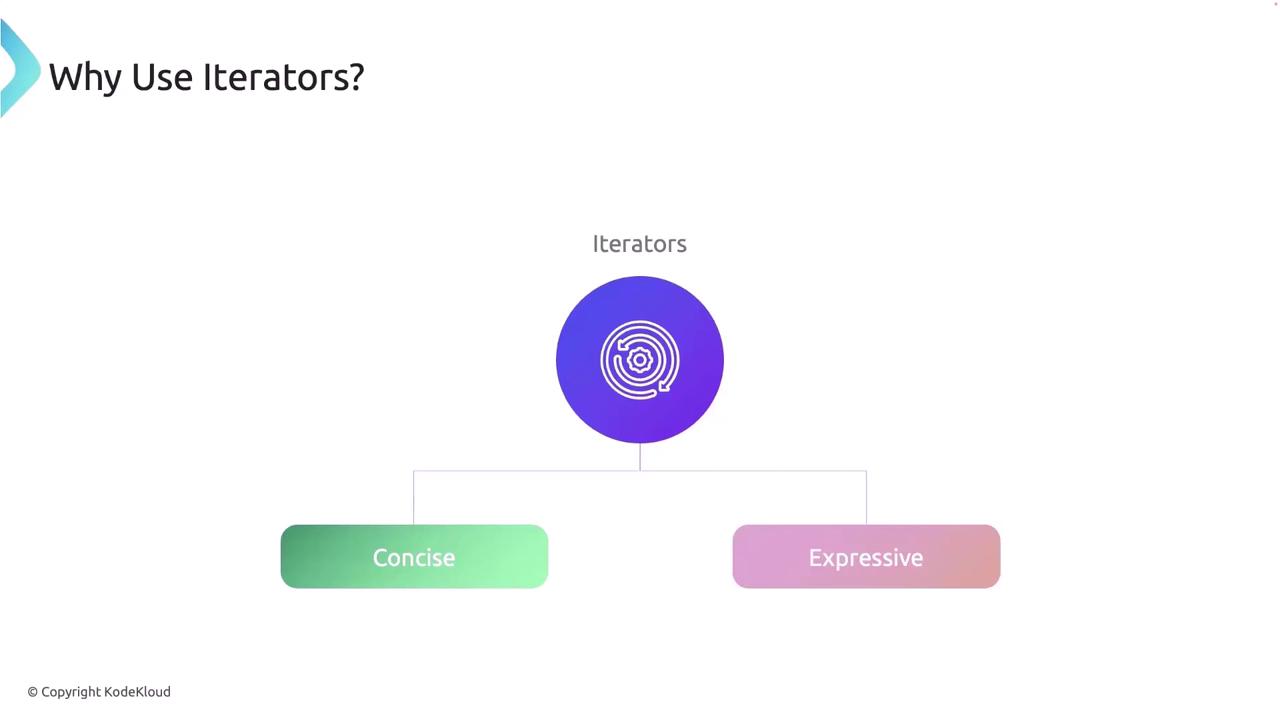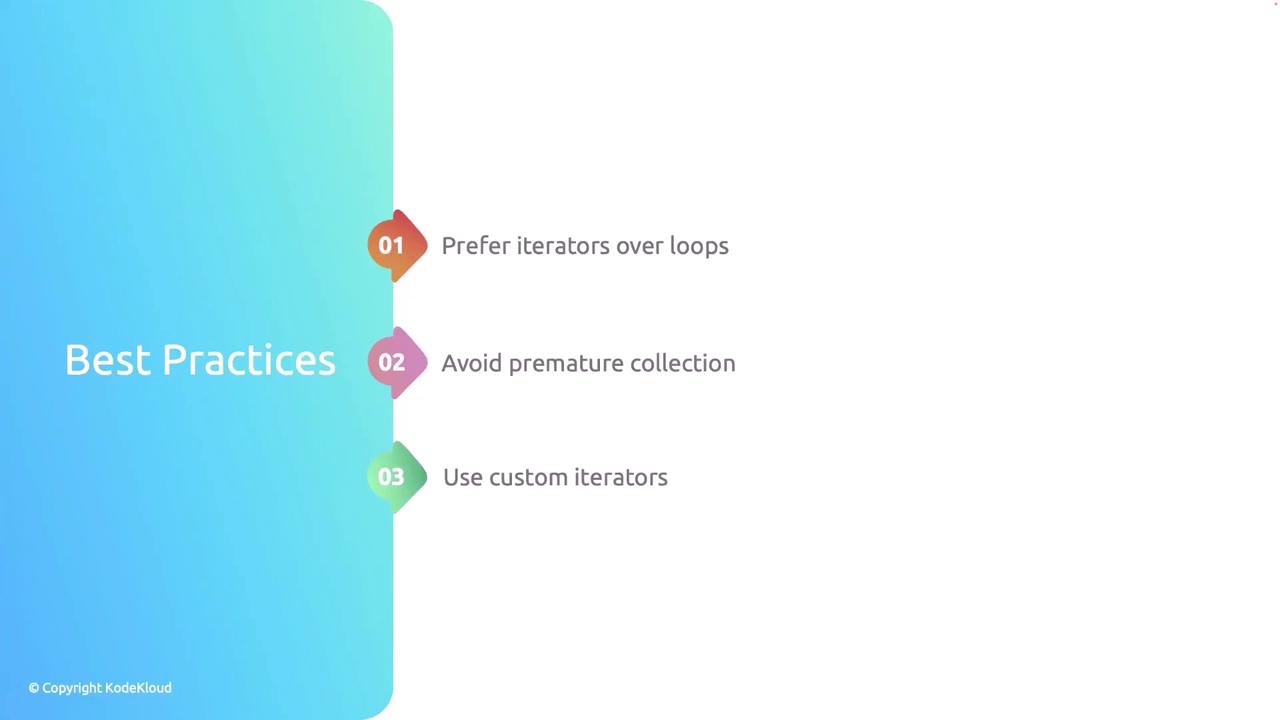Rust Programming
Closures and Iterators
Rusts Iterator Ecosystem Custom Iterators
In this lesson, we will explore Rust iterators—a powerful and flexible tool for processing sequences of elements. An iterator in Rust is any object that implements the Iterator trait, providing a standardized way to traverse a sequence of items. The standard library includes numerous iterator methods for mapping, filtering, and reducing collections.
![]()
Why Use Iterators?
Iterators offer a concise and expressive approach to handling collections. They help eliminate common pitfalls associated with manual loop management—such as off-by-one errors—and greatly enhance code readability and maintainability.

The Iterator Trait
At the core of Rust’s iteration system is the Iterator trait. It requires implementing just one method—the next method—which returns the next element in the sequence wrapped in an Option.
pub trait Iterator {
type Item;
fn next(&mut self) -> Option<Self::Item>;
// Other methods like map, filter, etc., are provided by default.
}
Here, type Item defines the type of elements yielded by the iterator. The next method advances the iterator, returning Some(value) when a value is available and None when the sequence is exhausted. Many default methods such as map, filter, and collect rely on a correctly implemented next.
Implementing the next Method: A Custom Counter
Consider the following example where we define a simple custom iterator named Counter. This iterator tracks a count that starts at zero and increments until it reaches 5.
struct Counter {
count: u32,
}
impl Counter {
fn new() -> Counter {
Counter { count: 0 }
}
}
impl Iterator for Counter {
type Item = u32;
fn next(&mut self) -> Option<Self::Item> {
self.count += 1;
if self.count <= 5 {
Some(self.count)
} else {
None
}
}
}
fn main() {
let mut counter = Counter::new();
while let Some(n) = counter.next() {
println!("{}", n);
}
}
In the main function, the while loop continuously calls next until it returns None, thereby printing the numbers 1 through 5.
Comparing Iterators and Traditional Loops
Traditional loops in Rust, like for and while, often require manual management of counters or indices, which can lead to mistakes. For example, a manual loop may look like this:
fn main() {
let numbers: Vec<i32> = vec![1, 2, 3, 4, 5];
for i in 0..numbers.len() {
println!("{}", numbers[i]);
}
}
cargo run --quiet
1
2
3
4
5
my_first_crate on master [+] is v0.1.0 via v1.82.0 took 4s
While this loop functions correctly, it is susceptible to errors such as off-by-one mistakes. For instance, consider this faulty example:
fn main() {
let numbers: Vec<i32> = vec![1, 2, 3, 4, 5];
for i in 0..numbers.len() + 1 {
println!("{}", numbers[i]);
}
}
cargo run --quiet
1
2
3
4
5
Running the above code produces a panic:
cargo run --quiet
1
2
3
4
5
thread 'main' panicked at src/main.rs:6:31:
index out of bounds: the len is 5 but the index is 5
note: run with `RUST_BACKTRACE=1` environment variable to display a backtrace
my_first_crate on master [!+] is v0.1.0 via v1.82.0
By contrast, an iterator-based approach abstracts away index management:
fn main() {
let numbers: Vec<i32> = vec![1, 2, 3, 4, 5];
for num in numbers.iter() {
println!("{}", num);
}
}
cargo run --quiet
my_first_crate on master [!] is v0.1.0 via v1.82.0
Iterators in Rust are zero-cost abstractions; the compiled code is as efficient as manually written loops. Additionally, they utilize lazy evaluation where operations such as map or filter only yield values when the iterator is consumed.
Consuming Iterators
Iterators are consumed when methods like for, collect, or fold are invoked, taking ownership of the iterator. For example:
fn main() {
let numbers: Vec<i32> = vec![1, 2, 3, 4, 5];
let sum: i32 = numbers.iter().sum();
println!("Sum: {}", sum);
}
After calling sum, the iterator is exhausted and cannot be reused. The following example demonstrates consumption in action:
fn main() {
let numbers: Vec<i32> = vec![1, 2, 3, 4, 5];
let mut iter = numbers.iter();
println!("First value: {:?}", iter.next());
let sum: i32 = iter.sum();
println!("Sum: {}", sum);
}
cargo run --quiet
First value: Some(1)
Sum: 14
Here, calling next consumes the first element; subsequently, sum consumes the remaining elements.
Another pattern uses a consuming while let loop:
fn main() {
let numbers: Vec<i32> = vec![1, 2, 3, 4, 5];
let mut iter = numbers.iter();
while let Some(value) = iter.next() {
println!("{}", value);
}
// The iterator is now exhausted:
println!("Next value: {:?}", iter.next()); // This will print `None`
}
cargo run --quiet
1
2
3
4
5
Next value: None
my_first_crate on master [✔] is v0.1.0 via v1.82.0
Other consuming methods such as collect, fold, and for_each similarly exhaust the iterator as they process each element.
Iterator Adapters
Iterator adapters allow you to convert one iterator into another without consuming it immediately. Common examples include map, filter, and chain.
The map Adapter
The map method applies a function to every element, producing a new iterator. For example:
fn main() {
let numbers: Vec<i32> = vec![1, 2, 3, 4, 5];
let doubled: Vec<i32> = numbers
.iter()
.map(|x: &i32| x * 2)
.collect();
println!("{:?}", doubled); // Output: [2, 4, 6, 8, 10]
println!("{:?}", numbers);
}
cargo run --quiet
[2, 4, 6, 8, 10]
[1, 2, 3, 4, 5]
my_first_crate on master [!+] is 🍄 v0.1.0 via v1.82.0
The filter Adapter
The filter method selects elements that satisfy a given predicate. Note the use of double dereferencing to handle references returned by .iter():
fn main() {
let numbers: Vec<i32> = vec![3, 15, 7, 12, 9, 18, 6];
let filtered_numbers: Vec<i32> = numbers
.iter() // Produces an iterator over &i32
.filter(|&&x| x > 10) // Keep only numbers greater than 10
.cloned() // Converts from &i32 to i32
.collect();
println!("{:?}", filtered_numbers); // Output: [15, 12, 18]
}
The chain Adapter
The chain method combines two iterators into one. In the following example, two vectors are chained. Note that copied() is used to convert references to owned values before collection.
fn main() {
let numbers: Vec<i32> = vec![3, 15, 7, 12, 9, 18, 6];
let more_numbers: Vec<i32> = vec![6, 7, 8];
let combined: Vec<i32> = numbers
.iter()
.chain(more_numbers.iter().copied())
.collect();
println!("{:?}", combined); // Output: [3, 15, 7, 12, 9, 18, 6, 6, 7, 8]
}
Lazy Evaluation
Rust iterators are lazy, meaning they do not perform any computation until they are consumed by an operation. Consider the following example:
fn main() {
let numbers: Vec<i32> = vec![3, 15, 7, 12, 9, 18, 6];
let mapped: impl Iterator<Item = i32> = numbers.iter().map(|x: &i32| x * 2);
// No computation takes place here.
for value in mapped {
println!("{}", value);
}
}
In this case, the mapping function is applied only when the iterator is consumed by the for loop.
Ownership and Borrowing with Iterators
Rust iterators typically borrow the data they traverse, meaning the original collection does not get modified or consumed.
Using iter (Borrowing)
fn main() {
let names: Vec<&str> = vec!["Alice", "Bob", "Carol"];
for name in names.iter() {
println!("{}", name);
}
println!("Names vector is still usable: {:?}", names);
}
cargo run --quiet
Alice
Bob
Carol
Names vector is still usable: ["Alice", "Bob", "Carol"]
my_first_crate on master [!] v0.1.0 via v1.82.0
Using into_iter (Taking Ownership)
Using into_iter transfers ownership of each element:
fn main() {
let names: Vec<&str> = vec!["Alice", "Bob", "Carol"];
for name in names.into_iter() {
println!("{}", name);
}
// Attempting to use `names` here will result in an error
println!("{:?}", names);
}
The above code will result in a compile-time error because names has been moved.
Using iter_mut (Mutable Borrowing)
Finally, iter_mut allows mutable access so that you can modify the elements in the collection:
fn main() {
let mut numbers: Vec<i32> = vec![1, 2, 3];
for num in numbers.iter_mut() {
*num *= 2; // Modifies each element
}
println!("Modified numbers: {:?}", numbers); // Output: [2, 4, 6]
}
cargo run --quiet
Modified numbers: [2, 4, 6]
Creating a Custom Iterator: Fibonacci Sequence
You can also implement the Iterator trait for your own types to create custom iterators. In this example, we implement a Fibonacci sequence iterator:
struct Fibonacci {
curr: u32,
next: u32,
}
impl Fibonacci {
fn new() -> Fibonacci {
Fibonacci { curr: 0, next: 1 }
}
}
impl Iterator for Fibonacci {
type Item = u32;
fn next(&mut self) -> Option<Self::Item> {
let new_next = self.curr + self.next;
self.curr = self.next;
self.next = new_next;
Some(self.curr)
}
}
fn main() {
let fib = Fibonacci::new();
for number in fib.take(10) {
println!("{}", number);
}
}
In this custom iterator, the Fibonacci struct maintains the state of the current and next numbers. The next method updates this state and returns the next number in the Fibonacci sequence, wrapped in Some. The iterator is limited to the first 10 elements using the take adapter.
Best Practices for Using Iterators

- Prefer iterators over manual loops: Utilize Rust's built-in safety and performance optimizations by relying on iterators rather than manually handling loop counters.
- Avoid premature collection: Take advantage of lazy evaluation to prevent unnecessary memory allocation and computation.
- Implement custom iterators when necessary: For complex iteration logic, create custom iterators to keep the codebase clean and maintainable.
Note
Remember that using iterators can lead to more concise and readable code. Their zero-cost abstraction ensures that you do not sacrifice performance.
This lesson has provided an in-depth overview of Rust iterators, covering how to consume them, how to extend their functionality with adapters, and how to implement custom iterators. By leveraging these techniques, you can write cleaner, more efficient, and highly maintainable Rust programs.
Watch Video
Watch video content
Practice Lab
Practice lab